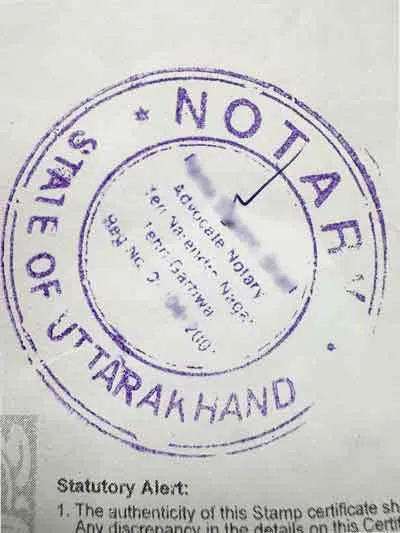What is Notary? Meaning, Importance, and FAQs

In India, every process of notarisation is mandatory for the authentic legalisation of documents. Whether it is an affidavit, an agreement or a power of attorney, a Notary Public holds an important place in verifying and certifying these documents.
However, there is much confusion in the minds of people with regard to what really is a notary, when and how it is used according to Indian law. This article clears everything that summarises the need for notarisation.
What is a Notary?
A notary (or notary public) is a legally authorised officer appointed either by the central or state government under the Notaries Act, 1952.
Their primary duties include:
- Verification of documents
- Attestation of signatures
- Administration of oaths
- Certification of copies of documents
- Prevention of fraud in legal matters
Every notarised document will thereafter have legal value and can serve as evidence before courts or any government office.
Why is Notarisation Important?
- Hold authenticity of Record: All notarized documents are deemed credible.
- Fraud Prevention: The notary recognises the identity of an individual and guarantees that no one has been forced.
- Legal Requirement: Documents (in particular Power of Attorney and affidavits) require notarisation under law.
- Admissible in Court: A notarised document is prima facie evidence unless rebutted.
Who Can Become a Notary in India?
According to the Notaries Act, 1952, a person must:
- Be a practising advocate for at least 10 years.
- Apply to the Central or State Government.
- Get a Notary Certificate after selection.
Common Documents that Need Notarization
- Affidavits
- Power of Attorney
- Sale Agreements (for property)
- Rental Agreements (optional in some cases)
- Identity affidavits
- Copies of Educational Certificates
Types of Notarization
- Attestation: Verifying signatures and documents.
- Administering an Oath: For affidavits or declarations.
- Certifying Copies: Declaring copies of original documents as true.
- Acknowledgement: Confirming that a person willingly signed a document.
How Much Does a Notary Charge?
Notary fees are regulated by the Notaries Rules, 1956. As of now:
- Attestation of signatures: ₹15 to ₹25 per document
- Certifying copies: ₹15 to ₹25 per document
- Administering oath: ₹15 per person
(Note: Charges can slightly vary by state and city.)
FAQs on Notarisation in India
-
1. What is the purpose of notarisation?
-
It authenticates the identity of the signer, prevents fraud, and gives legal credibility to documents for use in courts or government offices.
-
2. Is notarisation the same as self-attestation?
-
No. Self-attestation is when you sign your own document confirming its truth. Notarisation involves a government-appointed Notary Public verifying and certifying it.
-
3. Can digital documents be notarised online?
-
As of now, notarisation in India is largely physical. Some states allow e-notarisation for limited services, but you must check official portals like lawmin.gov.in or your district portal
-
4. Is notarisation required for property sale deeds?
-
No. Property sale deeds must be registered, not just notarised. Notarisation alone does not transfer ownership.
-
5. Can an affidavit without notarisation be used in court?
-
Usually not. Affidavits must be properly signed, stamped, and notarised to be admissible in legal proceedings.
-
6. What's the difference between notarisation and attestation by a gazetted officer?
-
A notary certifies documents for legal use. A gazetted officer attests mainly for government or educational purposes, such as applying for a job or passport.
-
7. Can I get my document notarised in another state?
-
Yes, but the notary must be authorised by the Central Government or that particular state. Check the list of authorised notaries on lawmin.gov.in.
-
8. How long is a notarised document valid?
-
There's no expiry date. It remains valid unless the facts or purpose of the document change.
-
9. What if a notary makes a mistake?
-
You can file a complaint with the State or Central Notary Cell. Misconduct may lead to suspension or cancellation of the notary's licence.
-
10. Is notarisation required for PAN or Aadhaar-related affidavits?
-
Yes. Affidavits for name, address, or date-of-birth correction must be notarised to be accepted.
-
11. Can a notary refuse to notarise my document?
-
Yes, if it's incomplete, illegal, or if identity proof is missing. The notary must ensure the signer understands and signs voluntarily.
-
12. Can a notarised document be used abroad?
-
No. For foreign use, documents need apostille or consular attestation, depending on the country.
-
13. Is notarisation required for rental agreements?
-
In most states, notarisation is optional for short-term rental agreements (under 11 months). Longer ones should be registered.
-
14. Can an advocate notarise documents for their own clients?
-
Only if the advocate is also a registered Notary Public. Otherwise, their attestation won't count as notarisation.
-
15. Where can I verify a notary's credentials?
-
Visit the Department of Legal Affairs portal at lawmin.gov.in → Notary Cell section for lists of authorised notaries by state and district.
Add new comment